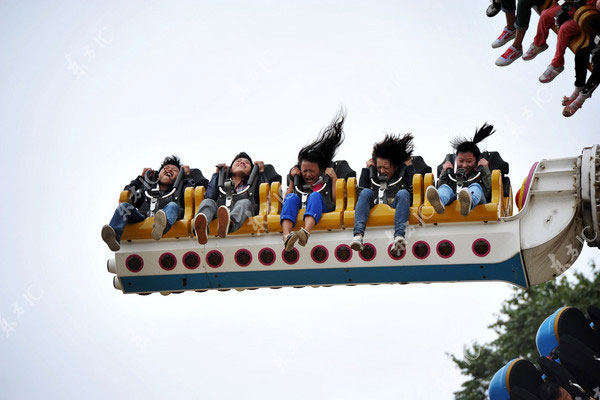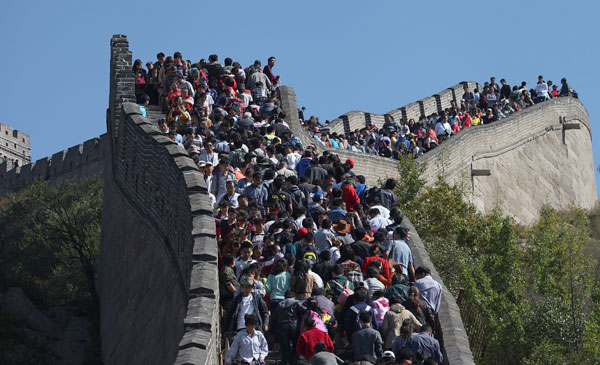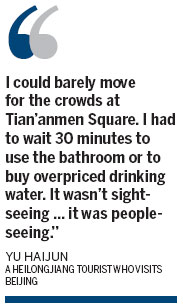Road to nowhere is route to despair
17 january 2013
Traffic jams and overcrowded sites leave many feeling they hit a dead end during the holiday, report Jiang Xueqing and Hu Yongqi in Beijing.
Crawling along at just a few kilometers an hour, Jiang Qian, a 25-year-old tour guide, and her group of 49, were trapped in a traffic jam for more than 18 hours on Oct 3. They were traveling from Kunming in Yunnan province to Lijiang, a well-known regional tourist spot.
 |
|
Visitors to Baiyun Park in Guiyang, Guizhou province, experience a hair-raising moment on Saturday. But speed and thrills are not normally associated with holiday travel as severe traffic congestion and overcrowding blighted the experience of many. Provided to China Daily |
 |
|
A section of the Great Wall at Badaling in the suburbs of Beijing was one of the most crowded scenic spots in China during the National Day holiday. Provided to China Daily |
Vehicles carrying tourists from across the country packed the mountain road, making it a huge parking lot, said Jiang. With no stores or bathrooms en route, people were famished and were forced to “do their business in bushes on the side of the road”.
Instead of arriving at Lijiang at 8 pm, the group finally made it to their destination at 4 am the following morning.
“People kept complaining, saying they wouldn’t have come if we’d warned them about the traffic,” said Jiang, who lost her voice explaining the situation to angry tourists. “We had no idea the traffic would be that bad.”
|
 |
Jiang said she had fewer customers than last year and most of the vehicles on the road were private cars. Some had traveled from Guizhou and Sichuan, and even further afield, from Heilongjiang province.
“I have been traveling this route for five years, and have never seen worse,” she said.
The nation’s roads were toll-free for the first time during the National Day holiday, from Sept 30 to Oct 7, for vehicles of seven seats or fewer. The new policy prompted many to take to the roads, but eventually the long delays caused chaos.
According to the China Highway Information Service, eight major expressways were still jammed on Oct 7, when the holiday officially ended. Experts said the traffic and tourism authorities should learn the lesson and be better prepared in future.
Sleep in the car
Jiang said her group waited in line for 10 hours to visit Yulong Mountain, the most famous tourist spot in Yunnan. “They waited so long, but in the end they didn’t have the time or space to stop to take a good look at the snowcapped peak. Crowd surges forced them to move on,” she said.
The massive influx of visitors prompted hoteliers to hike their room prices, from the usual 70 yuan ($11) per night to 1,100 yuan, she said. Many people had to sleep in their cars.
Yu Haijun, a 55-year-old from Heilongjiang province, complained that her trip to Beijing had been a mistake: “I could barely move for the crowds at Tian’anmen Square. I had to wait 30 minutes to use the bathroom or to buy overpriced drinking water,” she said. “I gave up on visiting the Great Wall and the Forbidden City. It wasn’t sightseeing it was people-seeing.”
Visitor numbers to the Forbidden City reached a record 182,000 on Oct 2. The same day saw thousands of tourists stranded at a cable car station on Huashan Mountain in Shaanxi province. Many visitors demanded a refund after waiting in line for more than three hours to no avail.
The wave of tourists left civic administrators under huge pressure, and by the end of Sept 30 about 50 metric tons of garbage had been left on a 3-km-long beach in Sanya, Hainan province.

Recent Comments